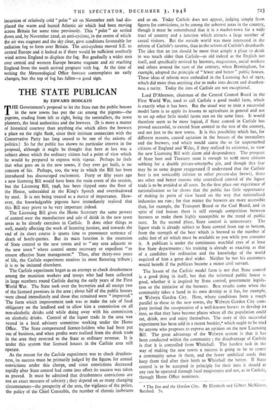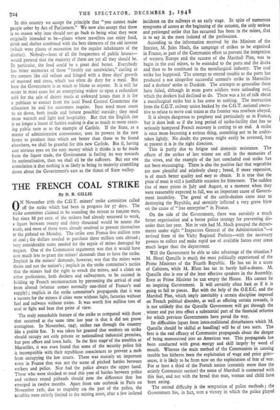THE STATE PUBLICAN
By EDWARD HODGKIN
THE Government's proposal to let the State run the public houses in the new towns has put the cat among the pigeons—the pigeons, reading from left to right, being the teetotallers, the town planners, the local authorities and the brewers. (It is more a matter of historical courtesy than anything else which allots the brewers a place on the right flank, since their intimate connection with the Conservative Party has long ceased to be one of the axioms of politics.) So far the public has shown no particular interest in the proposal, although it might be thought that here at last was a subject about which the ordinary citizen had a point of view which he would be prepared to express with vigour. Perhaps he feels that what goes on in the new towns, if they ever get built, is no concern of his. Perhaps, too, the way in which the Bill has been introduced has discouraged excitement. Forty or fifty years ago a new licensing Bill would have been the main event of the session, but the Licensing Bill, 1948, has been slipped onto the floor of the House,. unheralded in the King's Speech and overshadowed by steel. It is not being treated as a matter of importance. How- ever, the knowledgeable pigeons have immediately realised that this Bill may prove to be very important indeed.
The Licensing Bill gives the Home Secretary the same powers of control over the manufacture and sale of drink in the new town areas as he already exercises in Carlisle. It does other things as well, mainly affecting the work of licensing justices, and towards the end of its short course it spares time to pronounce sentence of , death of bottle-parties. But its main function is the extension of State control to the new towns and to "any area adjacent to the new town" where control seems necessary or expedient "to ensure effective State management." Thus, after thirty-two years of life, the Carlisle experiment receives its most flattering tribute ; it is to be imitated elsewhere.
The Carlisle experiment began as an attempt to check drunkenness among the munition workers and troops who had been collected in large numbers round Carlisle during the early years of the First World War. The State took over the breweries and all except two of the licensed premises in the area ; about half of the public houses were closed immediately and those that remained were "improved." The form which improvement took was to make the sale of food obligatory on the landlord and to allow him a commission on all non-alcoholic drinks sold while doing away with his commission on alcoholic drinks. Control of the liquor trade in the area was vested in a local advisory committee working under the Home Office. The State compensated licence-holders who had been put out of business, and when profits were realised from the drink trade in the area they reverted to the State as ordinary revenue. It is under this system that licensed houses in the Carlisle area still operate.
As the reason for the Carlisle experiment was to check drunken- ness, its success must be primarily judged by the figures for annual
convictions under this charge, and since convictions decreased rapidly after State control had come into effect its success was taken as proved. It must be admitted that drunkenness convictions are not an exact measure of sobriety ; they depend on so many changing circumstances—the prosperity of the area, the vigilance of the police, the policy of the Chief Constable, the number of chronic inebriates
and so on. Today Carlisle does not appear, judging simply from figures for convictions, to be among the soberest areas in the country, though it must be remembered that it is a market-town for a wide tract of country and a junction which attracts a large number of casual visitors. But the outside world was more interested in the reform of Carlisle's taverns, than in the reform of Carlisle's drunkards. The idea that an inn should be more than simply a place to drink in was much older than Carlisle—as old indeed as the English inn itself, and specifically revived by brewers, magistrates, social workers and others around the turn of the century, when Birmingham, for example, adopted the principle of "fewer and better" public houses. These ideas of reform were embodied in the Licensing Act of 1921, which did more than anything else to make inns decent and drunken- ness a rarity. Today the inns of Carlisle are not exceptional.
Lord D'Abernon, chairman of the Central Control Board in the First World War, used to call Carlisle a good model farm, which is exactly what it has been. But the usual way to treat a successful model farm is to apply its lessons to agriculture in general and not to set up other little model farms run on the same lines. It would therefore seem to be more logical, if State control in Carlisle has proved successful, to extend State control to the rest of the country, and not just to the new towns. It is this possibility which has, for different reasons, caused agitation in the breasts of the teetotallers and the brewers, and which would cause the so far unperturbed citizens of England and Wales, if they realised its existence, to view the new Licensing Bill with alarm and despondency. The prospect of State beer and Treasury stout is enough to sentl most citizens sobbing for a double private-enterprtse gin, and though this fear may be. to some degree exaggerated (I understand that the Carlisle beer is not noticeably inferior to other present-day brews), there are other and better reasons why centralised control of the liquor trade is to be avoided at all costs. In the first place our experience of nationalisation so far shows that the public has little opportunity of making its point of view heard on the way that nationalised industries are run ; for that matter the brewers are more accessible than, for example, the Transport Board or the Coal Board, and in spite of tied houses there is still enough competition between brewers to make them highly susceptible to the trend of public taste. In the second place, State control is unnecessary. The liquor trade is already subject to State control from top to bottom, from the strength of the beer which is brewed to the number of cubic feet of air which must be available to you while you consume it. A publican is under the continuous watchful eyes of at least five State departments ; his training is already as exacting as that of a candidate for ordination and the knowledge of the world required of him a great deal wider. Neither he nor his customers would benefit if the publican became a minor civil servant.
The lesson of the Carlisle model farm is not that State control is a good thing in itself, but that the reformed public house is good, whether it is inspired by State control, government legisla- tion or the initiative of the brewers. Best results come when the community takes a hand in its own destiny as it has, for example, at Welwyn Garden City. Here, where conditions form a rough parallel to those in the new towns, the Welwyn Garden City com- pany invited the co-operation of a well-known brewer to develop its inns, so that they have become places where all the population could eat, drink, rest and enjoy themselves. The story of this successful experiment has been told in a recent booklet,* which ought to be read by anyone who proposes to express an opinion on the new Licensing Bill. The great advantage of the Welwyn system is that it has been conducted within the community ; the disadvantage of Carlisle is that it is controlled from Whitehall. The hardest task in the way of making the new towns a success is going to be to create a community sense in them, and the fewer umbilical cords that keep them tied after their birth to Whitehall the better. If State control is to be accepted in principle for their inns it should at any rate be operated through local magistrates and not, as in Carlisle, through Home Office nominees.
* The Inn and the Garden City. By Elizabeth and Gilbert McAllister. Batsford. 5s.
In this country we accept the principle that "you cannot make people sober by Act of Parliament." We now also accept that there is no reason why inns should not go back to being what they were originally intended to be—places where travellers can enjoy food, drink and shelter combined with the best elements of the old taverns (which were places of recreation for the regular inhabitants of the district). Nobody—least of all the frequenters of public houses— would pretend that the majority of them are yet all they should be. In particular, the food could be a great deal better. Everybody has bitter memories of those "freshly cut sandwiches," curling at the corners like old vellum and fringed with a three days' growth of mustard and cress, which too often do duty for a meal. But here the Government is as much to blame as anyone. It is still far easier in most cases for an enterprising widow to open a redundant cafe for the sale of dainty meals at awkward hours than it is for a publican to extract from the local Food Control Committee the allocation he and his customers require. Inns need more room to sit down, both inside and (where possible) outside ; they need more warmth and light 'and hospitality. But that the English inn is no longer a haunt of furtive soaking is due as much to more exact- ing public taste as to the example of Carlisle. If the State, as a matter of administrative convenience, uses its powers in the new forms to produce inns which are better than those to be found elsewhere, we shall be grateful for this new Carlisle. But if, having cast envious eyes on the easy money which it thinks is to be made from the liquor trade, the Government is feeling its way towards its nationalisation, then we shall all be the sufferers. But our one consolation is that nothing is so likely to bring its majority crumbling down about the Government's ears as the threat of State wallop.



































 Previous page
Previous page